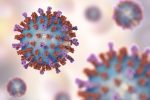Soliris Successfully Treats aHUS in COVID-19 Patient With Heart Transplant
Written by |

Soliris (eculizumab) was shown to effectively treat atypical hemolytic uremic syndrome (aHUS) triggered by COVID-19 in a patient who had undergone a heart transplant five years earlier, according to a recent case report study.
“We present a case of [a] 32-year-old Hispanic male with a history of heart transplant, admitted with COVID-19 and atypical hemolytic uremic syndrome, which was successfully treated with Eculizumab,” marketed as Soliris, the researchers wrote.
The study, “COVID‐19‐associated atypical hemolytic uremic syndrome and use of Eculizumab therapy,” was published in the Journal of Nephrology.
The patient was hospitalized in December 2020 due to fever, chest pain, cough, and shortness of breath (dyspnea) — all indicative of infection by SARS-CoV-2, the virus that causes COVID-19. The infection was later confirmed at the hospital.
The man had been diagnosed with leukemia, a blood cancer, at age 6, and received a heart transplant in 2015. In May 2020, he started showing signs of transplant rejection. He was then treated with the corticosteroid methylprednisone and bortezomib, a proteasome inhibitor used to treat diseases linked to the abnormal production of antibodies.
Also, he underwent plasma exchange therapy — a treatment that replaces the liquid portion of blood — and intravenous (into-the-vein) immunoglobulins (IVIG), a cocktail of antibodies.
At his last follow-up, his heart function was stable and his high blood pressure was under control, as was his chronic kidney disease, the researchers said.
At the time of his hospital admission, however, blood tests revealed he had high levels of several inflammatory markers, including ferritin and C-reactive protein. He also had sinus tachycardia — a condition that causes the heart to beat faster — and high blood pressure, but no fever.
A chest CT scan revealed the presence of multiple ground glass opacities — hazy gray areas — consistent with pneumonia associated with COVID-19. He was treated with broad-spectrum antibiotics and dexamethasone, a powerful anti-inflammatory, delivered into the vein.
A urine analysis revealed the presence of proteins and blood in the urine, both indicative of kidney impairment. Further lab tests showed the patient had high levels of creatine kinase, a marker of muscle damage.
Clinicians suspected thrombotic microangiopathy, a condition that leads to the formation of blood clots in small blood vessels. That suspicion developed after lab tests found signs of red blood cell destruction, worsening kidney failure, and low platelet counts.
All of the signs were consistent with aHUS triggered by COVID-19. The patient was given daily plasma exchange for three days, but without improvements.
At that point, he was started on intermittent hemodialysis — a type of treatment that filters out waste from the blood, mimicking kidneys’ function, that is usually conducted over a short period of time, typically three to five hours a day.
By day seven, his platelet counts had dropped markedly to 15,000 platelets per microliter (mcL) (normal range: 150,000–450,000 platelets per mcL of blood). By day 10, he underwent a kidney biopsy that found signs of mild thrombotic microangiopathy and aHUS.
On day 13, he started treatment with Soliris — at a dose of 900 mg per week — and continued to undergo intermittent hemodialysis three times a week. Marketed by Alexion Pharmaceuticals, Soliris is an approved treatment for aHUS that works by preventing the overactivation of the complement system. Abnormal activity by the complement cascade is the root cause of the disease.
Hemodialysis was stopped on day 21, or after three weeks of treatment. The patient was discharged from the hospital with instructions to continue Soliris therapy, at the same 900 mg weekly dose, for two additional doses. After that, treatment was to be done once and then every two weeks at a higher dose of 1,200 mg.
At the time the man left the hospital, his platelet levels were within a normal range, and his creatinine levels also were lower (2.29 vs. 7.75 mg/dL on admission). Of note, creatinine is a marker of kidney function, with elevated levels indicating poorer kidney function.
In a six-month follow-up visit, the man’s creatinine levels had dropped to 1.42 mg/dL and although he still had proteins in the urine, the estimated glomerular filtration rate (eGFR) — a measure of kidney function — was stable.
Two months later, the patient changed his medication to Ultomiris (ravulizumab), another approved therapy for aHUS marketed by Alexion. It has the same mechanism of action as Soliris, but remains active in the body for longer periods of time, requiring less frequent dosing. He continued treatment for at least six months.
“This may be one of the first reported cases of COVID-19- induced HUS being treated with the newer complement inhibitor Ravulizumab,” the researchers wrote.
At the time of manuscript preparation, the patient was on his sixth month of treatment. According to investigators, in keeping with the patient’s expressed wishes, his care team is planning “to explore stopping complement inhibitor therapy between 6 and 12 months if the patient continues to have stable kidney function and no return of other symptoms.”







